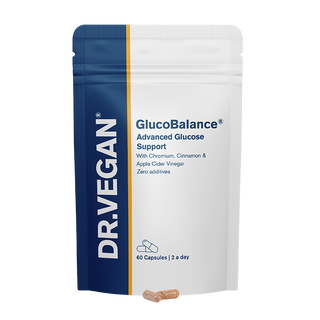10 signs of diabetes to look out for

Diabetes is a major global health problem - an estimated 537 million adults between the age of 20-79 were living with diabetes in 2021, with that number due to rise by 45% in the next 20 years.
Research shows people with Type 2 diabetes are 50% more likely to die prematurely, more likely to have a heart attack and develop other illnesses. Diabetes UK estimate 5 million people are living with diabetes in the UK, of whom 1 million don't know it. The good news is the risks of Type 2 diabetes can be mitigated through diet and lifestyle, and if you are pre-diabetic or have developed Type 2 diabetes, it can be reversed. Discover the link between diabetes & early menopause.
Our expert nutritionists explain the causes of diabetes, the tell tale signs of 'insulin resistance', how diabetes affects us, the symptoms to look out for and what you can do about it. You may also enjoy learning about the 'Warning signs of a heart attack to look out for' and the fascinating link between yeast infections and diabetes.
What is diabetes?
Diabetes is a condition where the body is unable to deal with blood sugar (glucose) effectively, creating high levels of blood sugar which increases the risk of serious health conditions. You may be interested in reading our nutritional therapist, Isabelle Nunn answer common questions about blood sugar levels.
Understand your diet. Create your free Diet Profile.
There are a few types of diabetes which cause slightly different problems and have different route causes, however, whatever the type of diabetes, the results of untreated diabetes are the same – high blood sugar and insufficient insulin to take that sugar into the cells for your body's energy production.
What causes diabetes
Our gut breaks down sugars and carbohydrates from foods we eat into blood glucose which then enters our blood stream. The insulin in our blood, which is secreted by the 'beta islet cells' of the pancreas, takes this glucose into our body's cells to be used for energy production. Our body also allows insulin to enter our brain because it carries serotonin, our 'happy hormone', so insulin is vital for our mood, mental wellbeing and sleep as well as our energy.
If your pancreas produces insufficient insulin, or your insulin becomes ineffective, it can't transport and utilise the blood glucose around your body to feed your body's energy and basic biological functions. This is known as 'insulin resistance' and you can learn more in 'What is insulin resistance'.
Discover GlucoBalance® | Advanced blood glucose management
The higher levels of blood glucose that aren't used by your body create an acidic state of the blood in your body's tissues, which in turn increases the risk of heart disease, heart attacks, kidney disease, nerve damage, eye disease and other illnesses.
Type 1 Diabetes
Often called 'juvenile onset diabetes' or 'insulin dependent diabetes mellitus', Type 1 diabetes most often starts in childhood, but it can also start in adulthood.
The cause of Type 1 diabetes is an autoimmune response against the 'beta islet cells' of the pancreas, which renders the ability of the pancreas to produce insulin ineffective, or at least inadequate. People with Type 1 diabetes are dependent on daily insulin injections for the rest of their life.
Type 2 Diabetes
Often called 'Adult-onset diabetes', or 'Non-insulin dependent diabetes', Type 2 diabetes is where the body's blood sugar levels have been high for a long period of time, and either the beta islet cells in the pancreas become tired and less efficient at producing insulin, or the insulin produced is less effective and doesn’t take the blood sugar into the body's cells effectively.
Vegan Omega 3

Type 2 diabetes can be controlled by a carefully managed diet and exercise, and can be reversed, however some people will also need the support of additional medication. You may enjoy 'Best foods for Type 2 diabetes'.
Other types of diabetes
Gestational diabetes: This is a type of diabetes that can occur during pregnancy. Gestational diabetes occurs in women who do not have diabetes outside of pregnancy, and it usually resolves itself after the birth of a child.
Neonatal diabetes: This type of diabetes is diagnosed in infants under the age of 6 months. Neonatal diabetes is different to Type 1 diabetes as there are no auto-antibodies present.
Wolfram Syndrome: Wolfram Syndrome is a genetic disorder with common features such as Type 1 and Type 2 diabetes, blindness and deafness.
Maturity onset diabetes of the young: This is a type of diabetes caused by genetic mutations which are passed down from a parent. Most people with this type of diabetes will be diagnosed before the age of 25.
Type 3c diabetes: Type 3c diabetes occurs as a result of another condition, typically pancreatic cancer, pancreatitis, cystic fibrosis or haemochromatosis, which is a condition where the iron levels slowly build up in the body over many years which, if not treated, can damage the liver, joints, pancreas and heart.
Who's at risk of diabetes?
Those with autoimmune diseases
Those with autoimmune diseases, especially multiple autoimmune diseases, are at risk of developing Type 1 diabetes. If you have other family members with Type 1 diabetes or other autoimmune disorders, you are more at risk of developing diabetes.
Being overweight
Being overweight is an indicator of poor blood sugar control that has occurred over time. This puts you at a higher risk of developing Type 2 diabetes.
Gut Works® | Pre & Probiotic, 50bn CFU
Long-standing poor diet
Whether you are overweight or not, long standing poor diet increases your risk of developing Type 2 diabetes. You might enjoy our nutritionists short blog 'Why is a varied diet so important?' and 'Is oat milk good for diabetes?'.
Family history
Your ability to deal with blood sugar does have a genetic link. If there is diabetes or insulin resistance in the family, you are at higher risk of developing it diabetes. Learn more in 'What is insulin resistance'. Central to any diagnosis of diabetes is measuring our blood glucose levels.
What are blood glucose levels?
Our blood glucose levels are the measurement of the level of sugars in your blood. If your blood glucose levels are elevated, it is an indication of pre-diabetes (also known as 'insulin resistance') or diabetes.
Normal blood glucose levels range from 4.0 to 5.4 mmol (millimole) per litre of blood when fasting, and up to 7.8 mmol per litre of blood two hours after a meal.
If you have your blood glucose levels tested, your doctor may perform something called a 'Glucose Tolerance Test' which involves two blood tests, one after fasting and one after the consumption of a sugary drink. You may also enjoy 'Symptoms of high and low blood sugar levels'.
10 symptoms of diabetes to look out for
There can be many symptoms of diabetes, caused by heightened or low levels of blood glucose. The most common symptoms of diabetes are:
- Regular increased thirst
- Frequent urination
- Fatigue
- Irritability
- Blurred vision
- Extreme hunger
- Slow wound healing
- Frequent infections
- Unexplained weight loss
- Breath smelling of pear drops and presence of ketones in urine
Discover symptoms of high and low blood sugar
There are also other symptoms of diabetes which are important to be aware of:
- Darker skin around the neck
- Skin tags
- Sexual dysfunction
- Dry mouth
- Nausea
- Aching and painful limbs
What nutrients do I need for diabetes?
Although not all types of diabetes can be avoided, some can, and there are a few nutrients that can help you to maintain normal blood sugar balance.
Chromium
Chromium is a trace mineral that is used for the metabolism of carbohydrates in our body. You need a balance of chromium in the body to keep blood sugar levels stable. Chromium can be found in grains, fruit, vegetables, nuts and seeds, and is a vital nutrient in GlucoBalance, an advanced formula for blood sugar control.
Shop GlucoBalance | Natural blood sugar control
Magnesium
Magnesium is another mineral needed for blood sugar balance. Magnesium is a 'mineral superhero' we all need, and many people do not get enough magnesium in their diet and a deficiency is common - learn more in 'How do I know if I'm deficient in Magnesium?'.
Magnesium works alongside insulin and helps to regulate insulin sensitivity. Many studies show an association between higher magnesium intakes and a lower risk of diabetes.
Great foods for magnesium are seeds, nuts, dark green leafy vegetables, dark chocolate, and don't forget you can easily add green veg to delicious green smoothies.
Alpha Lipoic Acid
Alpha Lipoic Acid is a nutrient found in broccoli, tomatoes, spinach and Brussels sprouts, and studies show it may help to lower blood sugar levels. It may also help to protect the body from free-radical damage in those with diabetes and neuropathy.
GLA
Gamma Linoleic Acid (GLA) is an omega-fatty acid that the body creates from 'linoleic acid'. Some people with diabetes are unable to convert linoleic acid into omega fatty acids and unless they get a direct source from their diet, they may become deficient. GLA is needed for the maintenance of the nerve membrane, and a deficiency may contribute towards nerve damage and pain.
Vitamin B1
Also known as Thiamin, Vitamin B1 is needed for the normal function of the nerves which can become damaged with uncontrolled diabetes. Good food sources of Vitamin B1 are beans, lentils, green peas and sunflower seeds.
Discover GlucoBalance®, advanced blood glucose support.
Shop our range of vegan vitamins and supplements.
Want to hear more from our nutritionists? Sign up to our free newsletter:





















